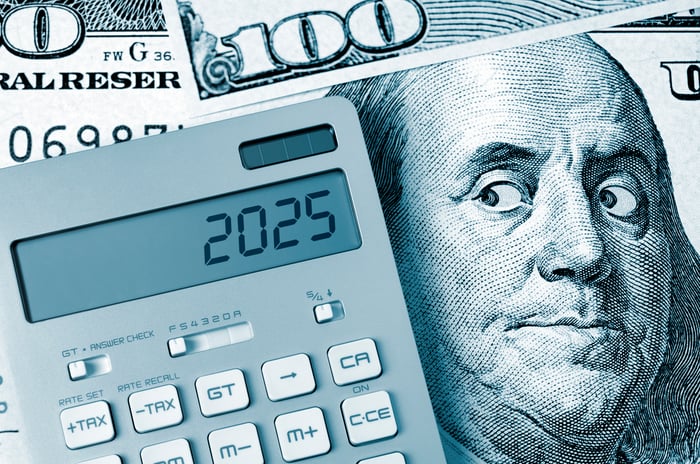Trading accounts
Platforms
News
We provide the latest news
from the world of economics and finance
We provide the latest news from the world of economics and finance

In less than two weeks, we'll turn the page on what should be another banner year for Wall Street. Through the closing bell on Dec. 17, the iconic Dow Jones Industrial Average, broad-based S&P 500, and growth-driven Nasdaq Composite were higher on the year by 15%, 27%, and 34%, respectively.
While these are undeniably hearty gains, Wall Street is all about looking forward and not reflecting too much on the past.
Where to invest $1,000 right now? Our analyst team just revealed what they believe are the 10 best stocks to buy right now. See the 10 stocks »
With this being one of the priciest stock markets in history, I'm not looking for a straight-line move higher for equities in 2025. But this doesn't mean I'm running for the sideline, either. I'm a long-term investor at heart, and the overwhelming majority of the 35 positions I'm set to enter 2025 with have been held for one or more years.
My investment philosophy is modeled similar to Warren Buffett in the sense that I believe my best investment ideas are deserving of an outsized percentage of capital. My top 10 portfolio holdings for 2025 currently account for 75% of my invested assets, excluding cash, and I'll be looking for them to outperform in what might be a challenging market.

My largest holding, brand-name and generic-drug developer Teva Pharmaceutical Industries (NYSE: TEVA), should enter 2025 on a high note after it and Sanofi reported stellar phase 2b data for experimental inflammatory bowel disease drug duvakitug earlier this week. Management's purposeful shift away from low-margin generic drugs to higher-margin, brand-name therapies should result in steady revenue and profit growth throughout the remainder of the decade.
What's more, Teva has decisively put its biggest concerns in the back seat. It's settled long-standing opioid litigation, and the company has reduced its net debt from north of $35 billion following the Actavis buyout in 2016 to roughly $15.7 billion, as of the end of September.
With Teva growing, once more, its forward price-to-earnings (P/E) ratio of 7.5 makes it a bargain.
Whereas Teva thrived in 2024, precious-metal miner SSR Mining (NASDAQ: SSRM) had a disappointing year that was highlighted by the tragic heap leach pad collapse at the Copler mine in Turkey. SSR expects to spend up to $300 million in remediation costs at Copler, with this containment work spanning 24 to 36 months.
However, I believe the sum of SSR Mining's parts is worth more than what Wall Street is currently valuing the company. The recently announced acquisition of the Cripple Creek & Victor gold mine from Newmont Mining, coupled with existing gold production from the Marigold and Seabee mines, suggests strong cash flow with gold hovering near an all-time high.
Further, SSR Mining has historically held a net-cash position and has more than enough capital to work its challenges in Turkey.
Although Wall Street is enamored with social media colossus Meta Platforms' (NASDAQ: META) artificial intelligence (AI) and metaverse ambitions, I continue to be amazed by its advertising dominance. Meta lured 3.29 billion daily active users to its platforms in the September-ended quarter, and there isn't a social media platform that's particularly close to rivaling these figures. More often than not, Meta should enjoy substantial ad-pricing power.
Meta's superior balance sheet and operating cash flow afford it the luxury of being aggressive with higher-growth initiatives, too. It closed out September with $70.9 billion in cash, cash equivalents, and marketable securities, and is pacing close to $85 billion in net cash from operating activities in 2024.
Even at a stone's throw away from an all-time high, Meta's forward P/E of 24 is reasonably cheap.
As you may be noticing, I'm a big fan of small-cap stocks and off-the-radar companies. My fourth-largest holding is dog-focused pet products and services provider Bark (NYSE: BARK), which primarily generates revenue from direct-to-consumer sales.
The great thing about pets is that they're almost always considered an extension of the family. People willingly open their wallets to ensure the health and happiness of their four-legged family members, which has resulted in pet expenditures rising regardless of what's happening with the U.S. economy.
Instead of focusing on breakneck sales growth, Bark's management team has aimed to rein in costs and generate positive cash flow, which has been successful. With direct-to-consumer gross margin approaching 65%, Bark has the tools to potentially reach profitability next year.
Another obscure small cap I've bet big on is furniture retailer Lovesac (NASDAQ: LOVE). This is a company that generates more than 91% of its net sales from sactionals, which are modular couches that can be arranged dozens of ways to fit most living spaces. It's difficult to find true differentiation in the furniture industry, but Lovesac's higher-margin products hit the mark.
Additionally, Lovesac benefits from its omnichannel sales platform. While it does operate brick-and-mortar stores in 42 U.S. states, it leans on direct-to-consumer sales, partnerships, and pop-up showrooms as a way to minimize overhead costs.
Though the company is working through some near-term challenges, it remains attractive based on its long-term growth potential.
My sixth-largest portfolio holding for 2025 is fintech juggernaut PayPal Holdings (NASDAQ: PYPL). Despite concerns about increasing competition in the digital payments arena, the average number of payments completed by active accounts over the trailing-12-month period has grown from 40.9 at the end of 2020 to 61.4, as of Sept. 30, 2024. PayPal's active user base is more engaged than ever.
The hiring of Alex Chriss as CEO last year has also hit the mark. Chriss came over from Intuit, where he focused on the company's Small Business Group segment. He fully understands the innovations needed to attract new businesses, but isn't afraid to tighten the belt, when needed, to boost margins.
I'll also add that PayPal's robust share repurchase program -- $5.4 billion worth of shares bought back over the trailing-12-months -- should provide a nice boost to the company's earnings per share.

Money-center goliath Bank of America (NYSE: BAC) is my longest-tenured holding (since 2011), and at this point one of the stocks I'm least likely to sell.
The beauty of BofA is that it's the most interest-sensitive of America's largest banks by total assets. While this does mean a rate-easing cycle can adversely impact Bank of America's net interest income, it also means the company continues to benefit from the steepest rate-hiking cycle -- 525 basis points, from March 2022 through July 2023 -- in four decades. The Fed's slow-but-steady approach to a rate-easing cycle should give BofA plenty of opportunity to thrive.
President-elect Donald Trump's victory in November is another positive for bank stocks. The incoming Trump administration is likely to relax banking regulations, which usually means more robust profits for the likes of Bank of America.
My eighth-biggest portfolio holding in the new year will be social media platform Pinterest (NYSE: PINS). Despite some vacillations in its monthly active user (MAU) count associated with the COVID-19 pandemic, a wider-lens look at Pinterest's MAUs shows a fairly steady incline spanning eight years.
With Pinterest's MAU count growing well past 500 million, advertisers have demonstrated a willingness to pay a premium. Global average revenue per user (ARPU) jumped 5% in the September-ended quarter, with double-digit growth in ARPU observed in emerging markets.
The other advantage Pinterest brings to the table is its operating model. Whereas most social media sites are heavily reliant on data-tracking tools, Pinterest's MAUs are freely providing valuable information on the things, places, and services that interest them. This is data that strengthens the company's ad-pricing power.
As you might have noticed, three of my top-10 holdings for 2025 are ad-driven businesses, with digital advertising small cap PubMatic (NASDAQ: PUBM) clocking in as my ninth-largest position.
What makes PubMatic such an exciting investment is that it finds itself at the center of the fastest-growing niche within advertising: digital ads. It offers a cloud-based programmatic ad platform that helps publishing companies sell their digital display space, with a focus on video, mobile, and connected TV -- all of which can deliver sustained double-digit growth in spending.
An interesting differentiator for PubMatic is that its management team chose to develop and build out its cloud-based infrastructure. Not having to rely on a third-party platform should lead to superior margins as revenue scales
I'd be remiss if I didn't also mention that PubMatic has over $140 million in cash, cash equivalents, and marketable securities, with no debt, and has been regularly repurchasing its own shares.
Last but not least, my 10th-largest portfolio holding for the new year is silver-focused miner First Majestic Silver (NYSE: AG).
First Majestic acquired Primero Mining in an all-stock deal in May 2018, leaving me with an exceptionally low cost basis of around $2 per share in First Majestic. I've reduced my stake in First Majestic Silver by 61% since this deal closed.
While there are plenty of reasons to be excited about the prospects for silver, such as growing demand for solar panels and the potential long-term ramp of electric vehicles, First Majestic Silver hasn't had the best track record of reducing production costs or consistently generating a profit.
Though new acquisitions (e.g., Gatos Silver) and a dip in capital expenditures offers hope for increased cash flow in 2025 (and beyond), I'll likely be trimming my stake in First Majestic, once again, next year.
Before you buy stock in Teva Pharmaceutical Industries, consider this:
The Motley Fool Stock Advisor analyst team just identified what they believe are the 10 best stocks for investors to buy now… and Teva Pharmaceutical Industries wasn’t one of them. The 10 stocks that made the cut could produce monster returns in the coming years.
Consider when Nvidia made this list on April 15, 2005... if you invested $1,000 at the time of our recommendation, you’d have $790,028!*
Stock Advisor provides investors with an easy-to-follow blueprint for success, including guidance on building a portfolio, regular updates from analysts, and two new stock picks each month. The Stock Advisor service has more than quadrupled the return of S&P 500 since 2002*.
See the 10 stocks »
*Stock Advisor returns as of December 16, 2024
Bank of America is an advertising partner of Motley Fool Money. Randi Zuckerberg, a former director of market development and spokeswoman for Facebook and sister to Meta Platforms CEO Mark Zuckerberg, is a member of The Motley Fool's board of directors. Sean Williams has positions in Bank of America, Bark, First Majestic Silver, Lovesac, Meta Platforms, PayPal, Pinterest, PubMatic, SSR Mining, and Teva Pharmaceutical Industries. The Motley Fool has positions in and recommends Bank of America, Intuit, Meta Platforms, PayPal, Pinterest, and PubMatic. The Motley Fool recommends Lovesac and recommends the following options: long January 2027 $42.50 calls on PayPal and short December 2024 $70 calls on PayPal. The Motley Fool has a disclosure policy.
The views and opinions expressed herein are the views and opinions of the author and do not necessarily reflect those of Nasdaq, Inc.
Founded in 1993 in Alexandria, VA., by brothers David and Tom Gardner, The Motley Fool is a multimedia financial-services company dedicated to building the world's greatest investment community. Reaching millions of people each month through its website, books, newspaper column, radio show, television appearances, and subscription newsletter services, The Motley Fool champions shareholder values and advocates tirelessly for the individual investor. The company's name was taken from Shakespeare, whose wise fools both instructed and amused, and could speak the truth to the king -- without getting their heads lopped off.